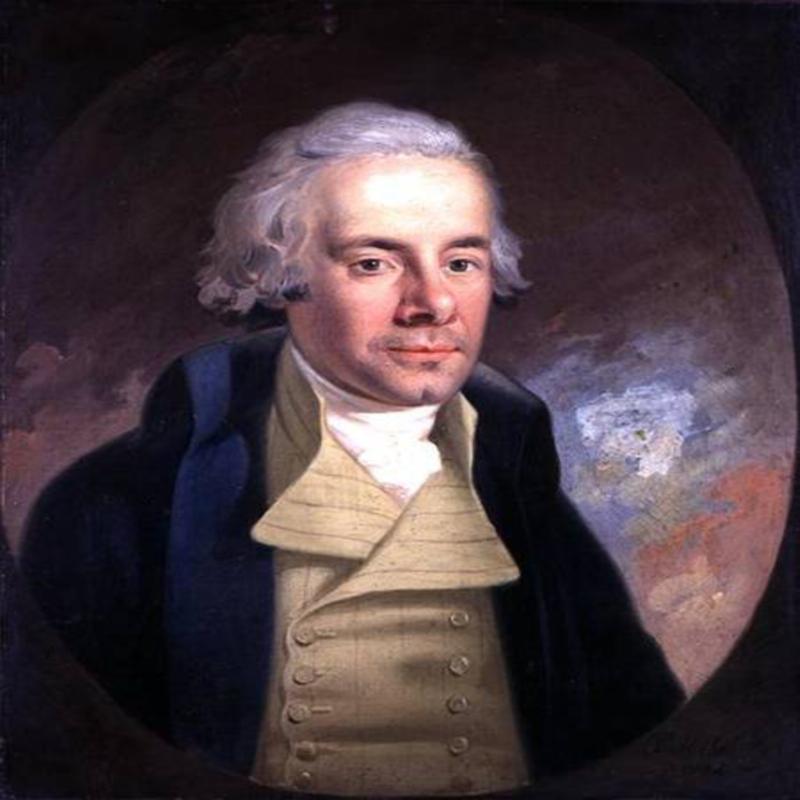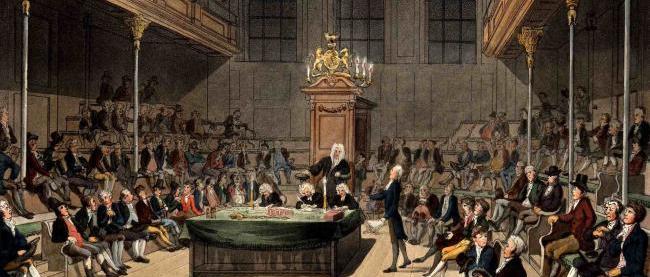William Wilberforce Addresses the House of Commons
Posted on 25th June 2021
A report from the Morning Star Newspaper (Wednesday 13 May 1789) of William Wilberforce’s first address to the House of Commons in his long campaign to abolish the slave trade:
In consultation with his friend the Prime Minister William Pitt upon whose tacit support he could rely he now pushed for a committee to be established to consider the many anti-slavery petitions that had recently been presented to Parliament:

Mr. WILBERFORCE then called the attention of the House to what he was about to propose. He said that he rose with a confession of what operated in his mind relative to the abolition of the Slave Trade. When I consider, says he, how long this has been suggested by many, and of what importance it is to a race of men, possessing qualities equally commendable with our own—how many millions are at present involved in the decision of the question—it is impossible for me to object in being instrumental to the business. He then remarked, that he was convinced, whatever should be the decision, that in bringing forward the discussion, he performed nothing more than his duty; and he was so fully persuaded of the rectitude of his conduct, that no consideration whatever would make him swerve from his honour so far, as to dissuade him from marching boldly forward on the occasion. It was no party question, and he flattered himself that the voice of reason and truth would be heard. He was resolved to be regulated by temper and coolness, and challenged a fair discussion.—It was not a proposition grounded upon particular motives of policy, but founded in principles of philanthropy. It was no idle expedient or speculation of the moment, but derived from the most mature deliberation. He came not to accuse the Merchants, but to appeal to their feelings and humanity. He confessed, that in the weak state of health in which he now appeared, and precarious as it might seem to many, he would stand against every personal idea, and bear the burthen destined for a person who stood in his situation. The subject had already undergone many discussions, and he apprehended that previous to a final decision, it would undergo many more. What must make every man of feeling shudder was, that, after examining the annals of Africa, numbers had been carried every year from their native country, in order to satiate the avarice of a certain description of men whose whole thoughts were bent upon tyranny and oppression.
Mr. Wilberforce then noticed that he had carefully examined the histories of the West Indies, and had attended to the times, when forgetting every idea of humanity they were torn from the protection of their friends. To delude them particularly from their native country, they generally set sail from Africa in the night time, and thus evaded reflections, which might be roused concerning their friends and relations ashore. This was a dreadful expedient; and till now, he could not believe that so much misery could be condensed in so little room. He could wish to rouse the feelings of every man on the occasion, and convince the people that their intention and aid were the were the result of consideration, which did awaken him. With regard to the gentlemen of Liverpool, he could do them the justice to believe that they would not seriously interrupt the abolition of the Slave Trade, especially when they understood that the characters of the people of this country were sullied by the outrages alluded to. Nothing, certainly, could excite them sooner to an acquiescence than the sight of 600 linked two and two; consequently to hear the gentlemen of Liverpool affirm, that the situation of these of these poor unhappy mortals, was comfortable, rather appeared strange and ridiculous. He then adverted to what had been adduced by Mr. Norris, in his evidence, who had made a comparison between an African Monarch, and an European, and declared that was called a Palace, was nothing more than a house of mud, where, however, every attention was made for that tenor of tranquillity which was so very desirable.—The manner of treating negroes, during a long voyage, was to the following effect:—the space between the decks is appointed entirely for their lodging; every attention is paid to keep that as clean as possible; the negroes are kept on deck all day, if the weather be fine; they are fed with two meals of comfortable victuals; they are supplied with the luxuries of pipe and tobacco, and a dram occasionally, when the coldness of the weather requires it; they are supplied with the musical instruments of their country; they are encouraged to be cheerful, to sing and to dance, and they do both; the women are supplied with beads to ornament themselves; they are kept clean shaved; and every attention paid to their heads that there be no vermin lodged there; they are secured with fetters on their legs, two and two together; and if a turbulent disposition appears, with another on the wrist; their apartments are clean washed, and fumigated with the fumes of tar and frankincense, and sprinkled with vinegar. As an extenuation of the crimes laid to the charge of the Agents for the Merchants, who are accustomed to this traffic, it has been mentioned with some degree of triumph, that they were treated on board with all manner of luxurious indulgence. The luxury alluded to was this—the song and the dance were promoted; the women were employed in weaving ornaments for the hair, and the utmost attention was observed to keep up their spirits. The truth of this observation was evidently the very reverse, and if it were possible to cast a film over the eyes of mankind, so as to deprive them of sight by a total blindness, the prevaricating mode of mentioning the transactions, could not be depicted in a more absurd point of view. The poor wretches were in such a deplorable state and unparalleled torment, and suffering such torture, that the surgeon who visited them, when bound two and two, could not pass without having his legs bitten by the slaves. Sir George Younge affirms that the stench was so intolerable as to be past all sufferance; and that in the article of water there was a miserable allowance. It was extremely worthy of observation to explain how the songs and dances were promoted. It was not a scene of freedom or spontaneous joy; for one man was employed to dance the men, and another to dance the women. If they found themselves inclined not to undergo the fatigue, certain persons were ordered to whip them into a compliance. To hear a recital of these facts would make people shudder; and the tear of sympathy would communicate from one man to another with congenial celerity. There was one Captain who declared that his feelings revolted at such measures. He applauded highly the sensations of this man, who had made such a concession in defiance of the barbarous practises already described. But death which on every occasion levels all distinctions, gave the unhappy victims that freedom from persecution and torture which otherwise they could not have received. When first I heard, Sir, of these iniquities, I considered them as exaggerations, and could not believe it possible, that men had determined to live by exerting themselves for the torture and misery of their fellow-creatures. I have taken great pains to make myself master of the subject, and can declare, that such scenes of barbarity are enough to rouse the indignation and horror of the most callous of mankind. Upon making an average of the loss sustained in the cargo of the Guinea ships, it appears that one-eighth of the whole generally suffered. Upon examining the Jamaica Report, another essential loss was discovered, numbers died by the attempt of seasoning the slaves, that is, changing them from one climate to another—sometimes the loss appeared by death to be 4 1-half per cent.—at other times 17 per cent. the last of which calculation is generally admitted by the best writers. In every common cargo, it has been observed, that about 50 or 60 perish. From the windward coast about Sierra Leona, the general average of mortality was not found more than three per cent. From Bonny, the number of slaves was not recollected that died on the voyage. From Benin, nine were buried out of 300 in the course of three months. But the general average of mortality from Benin, Bonny, New Calabar, Old Calabar, Cameroon, and Gabon, was much greater. That the slaves are subject to the following disorders: the small pox, measles, dysentery, fluxes, and fevers. They are rendered more sickly by laying up in land rivers. They generally lie longer on the coast than a slave ship does. An epidemical disorder on the coast prevails sometimes to a very great degree.—Mr. Jones had a ship, in which a fever broke out before she had purchased twenty slaves. This distemper carried off a great number of the crew in the course of a month. From every consideration I shall deal frankly with the House, by declaring, that no act of policy whatever will make me swerve from my duty and oblige me to abandon a measure which I think will be an honour to humanity. Mr. Wilberforce then mentioned, that he intended to submit to the consideration of the House, several resolutions, upon which a General Motion should be found for the total abolition of the slave trade. When, says he, I was persuaded of the frequent commission of the crimes mentioned, I found myself impelled to go boldly forward; and had before I had time to reflect, proceeded so far that I could not recede; but had I deserted the great and important undertaking, I should have considered myself wanting in that necessary portion of duty which I owed to my constituents and to my country. There is no accusation made against the gentlemen of the West India trade; but, by bringing forward the consideration of such a mighty object, we unite with the person of sensibility, that the measure is necessary, as founded in rectitude and universal benevolence. The great cause, it has been stated, of mortality in the West Indies is, that the slaves are very profligate and dissolute in their manners; but the principal cause, however, is their ill treatment; for the agents squeeze as much as possible from their exertions. Here the Divine Doctrine is contradicted by the reverse action—that sympathy is the great source of humanity.
Share this post:





